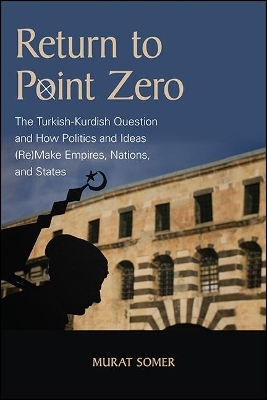
Return to Point Zero
The Turkish-Kurdish Question and How Politics and Ideas (Re)Make Empires, Nations, and States
Seiten
2023
State University of New York Press (Verlag)
978-1-4384-8672-7 (ISBN)
State University of New York Press (Verlag)
978-1-4384-8672-7 (ISBN)
Analyzes Turkey’s Kurdish conflict since post-Ottoman nation-building through recent peace attempts, from a novel perspective highlighting the dilemmas of the Turk majority and reshaping our understanding of ethnic conflicts, and offers solutions for a sustainable peace.
How did the Turkish-Kurdish Conflict arise? Why have Turks and Kurds failed for so long to solve it? How can they solve it today? How can social scientists better analyze this and other protracted conflicts and propose better prescriptions for sustainable peace? Return to Point Zero develops a novel framework for analyzing the historical-structural and contemporary causes of ethnic-national conflicts, highlighting an understudied dimension: politics. Murat Somer argues that intramajority group politics rather than majority-minority differences better explains ethnic-national conflicts. Hence, the political-ideological divisions among Turks are the key to understanding the Turkish-Kurdish Conflict; though it was nationalism that produced the Kurdish Question during late-Ottoman imperial modernization, political elite decisions by the Turks created the Kurdish Conflict during the postimperial nation-state building. Today, ideational rigidities reinforce the conflict. Analyzing this conflict from "premodern" times to today, Somer emphasizes two distinct periods: the formative era of 1918–1926 and the post-2011 reformative period. Somer argues that during the formative era, political elites inadequately addressed three fundamental dilemmas of security, identity, and cooperation and includes a discussion of how the legacy of those political elite decisions impacted and framed peace attempts that have failed in the 1990s and 2010s. Return to Point Zero develops new concepts to analyze conflicts and concrete conflict-resolution proposals.
How did the Turkish-Kurdish Conflict arise? Why have Turks and Kurds failed for so long to solve it? How can they solve it today? How can social scientists better analyze this and other protracted conflicts and propose better prescriptions for sustainable peace? Return to Point Zero develops a novel framework for analyzing the historical-structural and contemporary causes of ethnic-national conflicts, highlighting an understudied dimension: politics. Murat Somer argues that intramajority group politics rather than majority-minority differences better explains ethnic-national conflicts. Hence, the political-ideological divisions among Turks are the key to understanding the Turkish-Kurdish Conflict; though it was nationalism that produced the Kurdish Question during late-Ottoman imperial modernization, political elite decisions by the Turks created the Kurdish Conflict during the postimperial nation-state building. Today, ideational rigidities reinforce the conflict. Analyzing this conflict from "premodern" times to today, Somer emphasizes two distinct periods: the formative era of 1918–1926 and the post-2011 reformative period. Somer argues that during the formative era, political elites inadequately addressed three fundamental dilemmas of security, identity, and cooperation and includes a discussion of how the legacy of those political elite decisions impacted and framed peace attempts that have failed in the 1990s and 2010s. Return to Point Zero develops new concepts to analyze conflicts and concrete conflict-resolution proposals.
Murat Somer is Professor of Political Science and International Relations at Koç University in Istanbul, Turkey.
Illustrations
Preface
Acknowledgments
1. Introduction: Choices, Structures, and Politics in Creating and Solving Conflicts
2. The Three Dilemmas Explained
3. From Empire to Imaginable and Imagined Nations: How Did the Kurdish Question Arise?
4. How Was the Kurdish Conflict Created? A Nonstandard Explanation
5. The Changing Context of the 1990s: Seeing Kurds without Recognizing Them
6. Return to Point Zero: Why Did the Peace Initiatives in the 2000s Fail?
7. Ideational Bottlenecks
8. Return to Point Zero: New Political Choices Informed by New Ideas
Notes
Bibliography
Index
| Erscheinungsdatum | 03.10.2022 |
|---|---|
| Zusatzinfo | Total Illustrations: 30 |
| Verlagsort | Albany, NY |
| Sprache | englisch |
| Maße | 152 x 229 mm |
| Gewicht | 227 g |
| Themenwelt | Sozialwissenschaften ► Politik / Verwaltung ► Europäische / Internationale Politik |
| Sozialwissenschaften ► Politik / Verwaltung ► Staat / Verwaltung | |
| ISBN-10 | 1-4384-8672-3 / 1438486723 |
| ISBN-13 | 978-1-4384-8672-7 / 9781438486727 |
| Zustand | Neuware |
| Informationen gemäß Produktsicherheitsverordnung (GPSR) | |
| Haben Sie eine Frage zum Produkt? |
Mehr entdecken
aus dem Bereich
aus dem Bereich
Studienbuch
Buch | Hardcover (2023)
De Gruyter Oldenbourg (Verlag)
CHF 62,90
Amerikas Strategie der Vorherrschaft und der Kampf um Eurasien
Buch | Softcover (2024)
NOMEN Verlag
CHF 27,95


